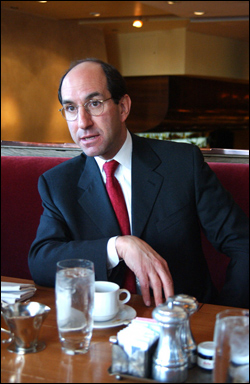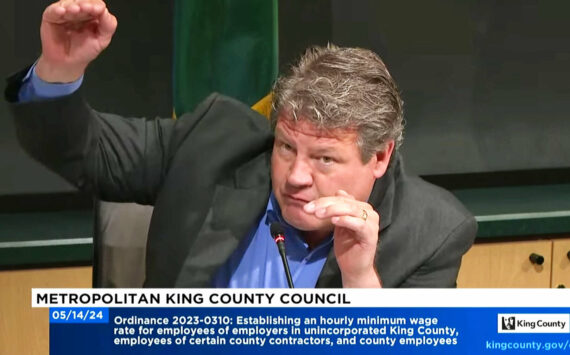A stream of people ascend the escalators of the Washington State Convention & Trade Center for Mark Sidran’s kickoff breakfast in his campaign for state attorney general, and it is hard not to think of the Arnold Schwarzenegger line: He’s baaack! Everywhere are signs for the former Seattle city attorney, onetime mayoral candidate, and veritable Satan figure for the slice of liberal Seattle that couldn’t stand the so-called “civility laws” he pushed through while he was the city’s top lawyer. Sidran’s bespectacled mug graces sign-in clipboards and looms large on video screens that project his image while speaking. And the scale of the event—1,300 people, include star endorser Gov. Gary Locke, and featuring a satiric candidate video dubbed “Lawyer of the rings”— makes plain that Sidran is a contender to be reckoned with.
He is, however, not the only such candidate. Although a relatively minor race in a presidential election year, it is one that draws some of the smartest—and most controversial—figures in local politics. Sidran’s opponent in the Democratic primary is Deborah Senn, the brash former state insurance commissioner who made a name for herself by aggressively combating health-insurance companies on behalf of the little guy, leaving a trail of loyalists and enemies. On the Republican side is a star of conservative politics, highly articulate Eastsider Rob McKenna, a longtime King County Council member. Lesser known, but an interesting candidate nonetheless, is Republican rival Mike Vaska, a prominent attorney who bucked his own party’s position to become a leading spokesperson against Tim Eyman’s first antitax initiative.
Each candidate has distinct strengths and weaknesses as they go before the entire state, but in overwhelmingly Democratic Seattle, it is Sidran who probably faces the biggest perception problem. As he himself acknowledges, people are always saying they thought he was a Republican. “Republicans say that to me, Democrats say that to me,” he concedes. His opponents are already angling to take advantage of that by painting him as a candidate who doesn’t even enjoy the support of his own party. “A lot of Mark’s base is not going to be voting in the Democratic primary,” says Blair Butterworth, Senn’s political consultant. Chris Vance, chair of the state Republican Party, asserts that “Sidran is somebody I don’t think the Democrats are going to be excited about. . . . I’ve had people approach me and say that Mark Sidran is saying he might want to run as a Republican in the race.” Vance would not identify these “people,” and Sidran says “it’s absolutely and completely untrue.” He notes that he was a Democrat even in high school, when he was co-chair of a student group for former Democratic U.S. Sen. Brock Adams.
Nevertheless, Sidran makes no bones about the fact that he believes in law and order. “It beats the alternative,” he quips in typical wisecracking style during his kickoff speech last Wednesday, March 24. After the speech, over coffee at the nearby Elliott Grand Hyatt hotel, Sidran more seriously defends his record. His legacy ranges from ordinances prohibiting public peeing and sidewalk loitering to one that calls for impounding the cars of people caught driving with a suspended license, all of which critics believed discriminated against minorities and the poor. A fast talker, the 52-year-old insists upon delving into the details of these ordinances, feeling they have been mischaracterized by political and media sound bites. “There are good reasons why a liberal City Council and an African-American mayor with impeccable liberal credentials [former Mayor Norm Rice] supported these laws, and why no one has ever advanced their repeal,” Sidran says.
Actually, members of the council, including Nick Licata, made a bid to repeal the impound ordinance just this week. The council put the issue on hold for the time being, but it continues to simmer. Sidran continues to defend his ordinance, arguing that “it’s better to lock up cars than to lock up people.” Before the impound program began, he says, police would often jail drivers with suspended licenses. Afterward, with impounds serving as intervention, the number of people so jailed went down 68 percent. Others contend that you don’t necessarily need to jail people or impound vehicles.
You could go round and round with Sidran on these issues. But when it comes to the attorney general race, he appears to have thought the job through carefully and has ideas liberals are bound to like. Sidran notes that the attorney general does not have regulatory or prosecutorial power in a lot of areas. The office’s most central function is to provide legal counsel to the governor, elected officials, and 220 state agencies. But, he says, “The attorney general is the primary prosecutor for consumer protection and antitrust laws.” Not unlike his rivals, Sidran points to a need for combating Internet crimes like identity theft. He advocates this emphasis with more zest than most, however.
“Per capita, our state is No. 4 in the country in consumer fraud complaints, No. 10 for identity theft,” he tells the Convention Center crowd. “Imagine if street crime was dominating the headlines the way white-collar crime is today. Can anyone doubt that the public would be up in arms, demanding more police, more law enforcement?” Sidran pledges to double the capacity of the attorney general’s consumer protection division and to create a new victim assistance unit to help those who have been swindled.
At a Pioneer Square Starbucks, rival Senn (and Sidran’s cousin by marriage) has a harder time defining what she would do as attorney general. As insurance commissioner, Senn found a target for her populist combativeness that needed to be fought. She stood up for the people’s right to health care at a time when that cause was in serious jeopardy. Unmoored from the insurance arena, Senn retains the combativeness but seems to be in search of targets.
“You bring your own interests to the job,” she says, adding that she expects to continue work on health care. When asked how she might further the cause, she points to a suit that current Attorney General and gubernatorial candidate Christine Gregoire pursued, along with other attorneys general nationwide, against pharmaceutical company Bristol-Myers Squibb for allegedly improperly trying to keep generic drugs off the market. But Senn says she doesn’t know whether that’s a rampant problem and warrants more litigation.
The issue of rising gas prices is another she suggests she might tackle as attorney general. “Look, we’re going to be seeing $3 gas prices,” Senn says. She doesn’t know whether any laws are being broken, though. As attorney general, she says she would see “if there is something to look at.”
While Senn is not exactly sure whom she might sue, she clearly likes the idea of the big, splashy lawsuit. She notes that some people have said that New York state Attorney General Elliott Spitzer “is literally acting like the FTC” (the Federal Trade Commission), an apparent reference to Spitzer’s high-profile prosecutions on Wall Street. That gives you an idea of the office’s power, she says, which is even greater when attorneys general from different states work together, as in the big national effort Gregoire helped lead against tobacco companies. She says that kind of joint effort is “the thing that’s so interesting, so exciting about the attorney general’s office.”
Senn, 55, denies that she’s overly interested in suing people. But she says of the attorney general’s office: “I do see it in a more activist way than, say, Sidran.”
One wonders if Republican McKenna would be an activist for a conservative agenda. The boyish 41-year-old is not strident. Although an antitax suburbanite who’s consistently supported conservative causes, including some of Eyman’s initiatives, he’s been a rational force on the County Council and is attuned to the concerns of diverse places like the Rainier Valley.
Moreover, over coffee in Bellevue, McKenna says he is wary of the type of multistate lawsuit Senn lauds. The same kind of power that interests Senn is something McKenna feels can be abused. He is suspicious, too, of what he has heard: that private attorneys have been shopping potential lawsuits at meetings of the National Association of Attorneys General. (Attorneys general sometimes hire private attorneys to help work on cases.) So McKenna wouldn’t be bringing his conservative ideology to bear in that way.
But, alone among candidates, McKenna wants to use the office as a platform for tougher law enforcement. The office does not typically handle generic criminal cases. However, small counties that need help on complex cases can turn to the attorney general for prosecutorial help. McKenna thinks the office has a larger advocacy role to play “in part because the attorney general is the only law enforcement-related office that’s statewide.” So, for example, he says he would like to lobby for tougher penalties for car theft. He says you can steal a car seven times before being sent to state prison.
A couple other areas he wants to work on are cyber crime and drug trafficking. He observes that methamphetamine is a huge problem in rural Washington. “How we could do more for those issues is something I’m working out,” he says. Like Senn, McKenna seems to be still trying to get his arms around what the job might entail. It’s a job that, in his case, is very different from the political job he occupies now.
With such a well-known Republican in the race, why did Vaska jump in? The 43-year-old partner at Foster Pepper & Shefelman says he did so because he believes “the state has become too partisan, too ideological.” He’s a follower of the Dan Evans school of moderate politics. Indeed, he says, the former Republican governor and U.S. Senator, and his wife, challenged him to run in this race. In a campaign letter on Vaska’s behalf, Evans notes Vaska’s “ability to get things done on a bipartisan basis.” Most notably, Vaska worked with an array of players on the immense transportation package, Referendum 49, put before voters in 1998. The next year, Eyman’s Initiative 695, slashing car tabs to $30, threatened to eliminate all the funding Vaska had helped secure. Despite the Republican Party’s endorsement of the initiative, and the feeling among many that the initiative was too popular to oppose, Vaska stepped up to debate Eyman around the state.
In addition to Evans, Vaska is supported by a figure well known in Democratic circles, Bob Watt, a deputy mayor under Rice and now a Boeing vice president.
Vaska is focusing on an aspect of the office that is distinctly nonpartisan: the spiraling amount of money the state has been paying in lawsuit claims, about $170 million between 2000 and 2003. As someone who, as a lawyer, helps corporations manage their risk, Vaska thinks he can help by making sure state agencies know what conduct is appropriate and by assembling legal teams that will win lawsuits in court. It’s not a sexy issue, and that seems to be OK with Vaska. “This is a serious lawyer job,” he says.








